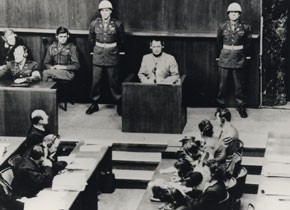Marcel Ophüls
May 28 to June 11, 2010
Marcel Ophüls is a central figure in documentary filmmaking. Since the late 1960s, he has produced some of the most influential documentaries of all time, including masterpieces such as The Sorrow and the Pity (1969), The Memory of Justice (1976), Hôtel Terminus (1985-88) and The Troubles We’ve Seen (1994). These multi-hour and multi-voice panoramas have permanently changed our understanding of how ‘history’ and ‘reality’ are portrayed in film – and they have spawned innumerable followers in documentary as well as in popular political cinema.
For many years, Ophüls represented the archetypical documentary filmmaker in the eyes of the general public: the brilliant “Professional Memory Man,” who investigated the foundations of post-war society more deeply than any other director. A proponent of critical remembrance for whom the contemporary meaning of history was just as important as the truth of the past, he delved into the archives to relate the legacy of 20th century dictatorships to the present-day. Ophüls linked investigative journalism with the art of cinema: even today, his films astonish with their opulence and intellectual richness, their virtuoso editing and deft blending of a variety of sources, and not least through the director’s legendary interviewing technique (with Ophüls himself often acting in front of the camera). Based on the possibilities of “oral history,” his “documentary marathons,” as Ophüls himself described them, are constantly surprising and transform the most complex historical material into exciting crime thrillers.
Ophüls, who was born in 1927 in Frankfurt and fled as a child with his parents escaping the Nazis to France and to America, is a cosmopolitan par excellence. His biography is marked with exile and displacement, but also by the experience of a democratic culture in the USA and the contradictions of the Cold War, by the 1968 uprising in France, and by the experience of a life in the cinema as the son of Max Ophüls and the actress Hilde Wall. His own career in film began first in proximity to the French New Wave, then as dramaturge for German television plays and as critical journalist for French television. It was in France, with Munich ou las paix pour cent ans (1967), that Ophüls created his first historical documentary, about the 1938 Munich Agreement. It was followed by Le Chagrin et la pitié (The Sorrow and the Pity) – a groundbreaking work on the French collaboration with the Nazis, which became a cinematic event and a political cause celèbre.
Fired by French TV, Ophüls again worked in Germany (Auf der Suche nach meinem Amerika) before directing his monumental film on the Nuremberg Trials, The Memory of Justice. At that time Ophüls, who today still maintains both American and French citizenship, was living and teaching in the U.S., where he also produced his best known (and Academy Award-winning) film, Hôtel Terminus, about the Gestapo butcher, Klaus Barbie. In fairly short succession he presented two more major works: November Days (1991), about the fall of the Berlin Wall, and The Troubles We’ve Seen, using the conflict in the former Yugoslavia as an example of the changes in international war reporting. Taken together, these films reveal a unique chronicle of the 20th century – a passionate examination of the relations between society and the individual: marked by moral clarity, the works can be read as a pamphlet against the false cleverness and complicit cynicism of our times.
A joint presentation of the Austrian Film Museum and Navigator Film, in the framework of the Vienna Festival (Wiener Festwochen) and supported by the Film & Music Industry Association, as well as by ERSTE BANK.
Related materials
In Person Video Document Marcel Ophüls 31. May.2015
